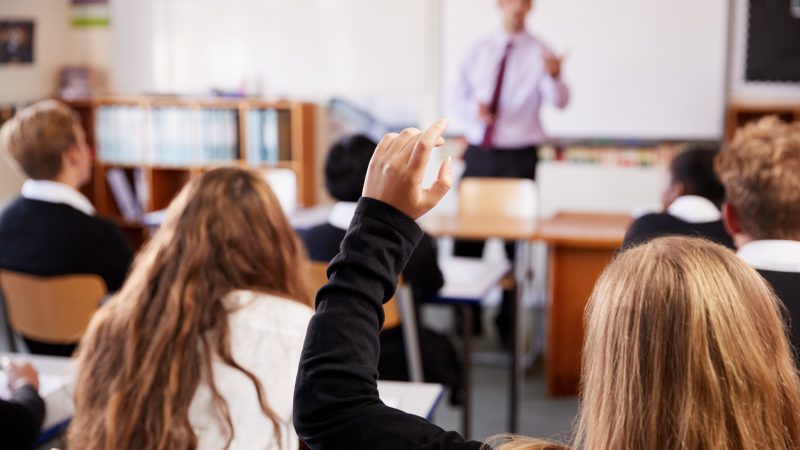
Education trade unions have called on the government to take urgent action to prevent disruption to schools in the run-up to Christmas amid concerns over rising cases of the Omicron variant and increasing classroom absences.
Four unions – UNISON, GMB, Unite and NASUWT – have urged ministers to take steps, including providing air filtration devices where airflow problems are detected and making face masks mandatory in all areas of secondary schools.
They are also calling for full pay for staff who need to isolate due to Covid and for extra resources for schools to contact pupils and families who have been in close contact with a positive case. NHS Test and Trace no longer does this routinely.
NASUWT general secretary Patrick Roach said the measures would help control the spread of the virus, emphasising the high level of Covid rates in schools and warning that the Omicron variant now “threatens a further wave of infections”.
The four unions have organised a day of online action, encouraging staff, parents and pupils to lobby politicians by writing to their MPs, tweeting and posting messages on social media with calls to ‘protect education’ and ‘protect pupils’.
Also highlighting the high rates in schools, GMB national officer Avril Chambers said it “beggars belief” that the government says no additional measures are needed. She added: “Our children deserve not to have their education interrupted any more than it already has been. The minister needs to act now.”
Covid rates are highest among school-aged children and 200,000 pupils were reported absent for Covid-related reasons on November 25th. An additional 77,000 children aged between two and 16 are suffering with ‘long Covid’, according to the Office for National Statistics.
UNISON assistant general secretary Jon Richards said: “Omicron is spreading fast. If ministers are serious about face-to-face teaching, then they need to act immediately so schools are safe for pupils and staff.”
Downing Street has confirmed that Omicron appears to be more transmissible than other variants, while Boris Johnson said during Prime Minister’s Questions on Wednesday that the new variant is spreading at a “much faster” rate.
“School staff are once again on the frontline of the pandemic. The minimum the government should be doing is to bring in extra safety measures to protect them,” Unite national officer Jim Kennedy said.
Professor Neil Ferguson, a member of the Scientific Advisory Group for Emergencies (Sage) and head of the disease outbreak modelling group at Imperial College London, said Omicron would likely become the dominant strain in the UK before Christmas.
“We’ll start seeing an impact on overall case numbers. It’s still only 2%, 3% of all cases so it’s kind of swamped, but within a week or two we’ll start seeing overall case numbers accelerate quite markedly as well,” he said on Wednesday.
He described the pace of growth of Omicron cases in the population as “very fast”, adding that speed of the spread is “the same if not faster than we saw with the original strain of the virus in March last year, so it is a concern”.
The number of cases of the Omicron variant, originally detected in South Africa but since found in countries across the world, in the UK increased by 101 to 437 on Tuesday. Scotland has announced a return to working from home in response.
At a press conference on Wednesday evening, Johnson told viewers that England would be reverting to ‘plan B’, which includes the introduction of vaccine passports in some settings, a return to work from home guidance and extending the legal requirement for face masks.
Tory MP William Wragg accused the Prime Minister of using plan B as a “diversionary tactic” to deflect attention away from reports that a Covid rule-breaking party was held in Downing Street in the run-up to Christmas last year.




More from LabourList
SPONSORED: ‘Industrial hemp and the challenge of turning Labour’s priorities into practice’
‘A day is a long time in politics, so we need ‘action this day’’
Strong support for child social media ban among Labour members, poll reveals